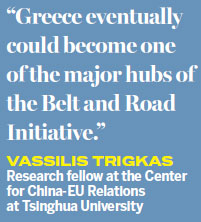Passage to piraeus
Updated: 2016-04-15 08:52
By Maria Petrakis in Athens and Lyu Chang in Beijing(China Daily Europe)
|
|||||||||
|
An aerial view of a container and car terminal in the port of Piraeus in Greece. [Photo/Agencies] |
A major new airport planned for Crete would give the Chinese an additional foothold in the Mediterranean.Cosco is also thought to be among the suitors to purchase Greece's train operator, Trainose.
The Athens-based Foundation for Economic and Industrial Research estimated in March that the deal would add 0.8 percentage point to GDP growth by the end of 2025, create more than 31,000 jobs - in a nation with the EU's highest unemployment - and reduce public debt by 2.3 percentage points of GDP. It could draw 867 million euros in investments from other companies in the next 10 years.
"Greece eventually could become one of the major hubs of the Belt and Road Initiative, and if investments in logistics and infrastructure are complemented by a stable macroeconomic environment and regulatory predictability, it can attract many more investments in other sectors as well," says Vassilis Trigkas, a research fellow at the Center for China-EU Relations at Tsinghua University. "With Piraeus, China has acquired a very strategic port."
The deal, the first overseas investment after Cosco emerged from the merger of two major Chinese shipping companies in December last year, was followed by a slight surge in shares of China Cosco Holdings Co, a subsidiary, that witnessed a 2.13 percent increase to 6.24 yuan ($0.96; 0.84 euros) on April 11.
Zhou Mi, a senior research fellow at the Chinese Academy of International Trade and Economic Cooperation, says the move would not only boost regional connectivity and cooperation between China and Europe, but also provide better services to Chinese companies.
"After gaining the majority stake in the port, I think that it will also help Cosco design customized services and better manage in terms of containers, routes and timetables to better serve the Chinese clients," he says.
Tu Xinquan, director of the China Institute for WTO Studies at the University of International Business and Economics, says the agreement is a win-win situation for both countries.
"The port is of strategic importance for China and helps boost ties and trade between the two regions. But debt-laden Greece still needs the investment to boost its economy and generate local employment," he says.
The deal will be even more important for the countries in Central and Eastern Europe from the trade perspective, Tu adds.
"Those countries are banking on the Belt and Road Initiative to expand exports of agricultural products and other commercial goods to China, their major trade partner."
The acquisition was not done in a day, Tu points out, adding that the Chinese company been operating at the port for many years.
"The Chinese company is very experienced in terms of port management," he says. "I think after the transaction it will reduce the cost of transportation and trade."
The deal has been no small feat. On the day of the signing, apart from protesting dock workers in Athens, who scuffled with police, there were thousands of refugees from Syria, Afghanistan and Iraq camped on one of the piers of Piraeus Port, testimony to the geographical advantages of Greece that drew Cosco to Piraeus in the first place. Tsipras, whose election platform in January had initially included plans to put a brake on state asset sales such as Piraeus Port, is set to visit Beijing in June, in line with the new Greek foreign policy imperative of wooing China, prompted by important links between Greek shipowners - who still own one of the world's biggest fleets - and China, Petropoulos at the University of the Peloponnese says.
In the months before Cosco won the 2008 deal to operate two piers in Piraeus, Greek officials such as then- president Karolos Papoulias underlined that 60 percent of Chinese maritime import trade was conducted by Greek-owned cargo ships and that Chinese shipyards were planning to build a large number of Greek vessels.
Related Stories
COSCO buys stake in big Greek port 2016-04-12 08:59
COSCO's acquisition of Greek Piraeus Port to further contribute to local economy 2016-04-11 11:02
COSCO orders 10 VLOCs from CSSC 2016-04-01 11:12
China COSCO, Vale sign agreement on iron ore shipping 2016-03-19 13:29
COSCO set to reshape shipping alliances 2016-02-27 10:06
Today's Top News
Embryos growing in space a 'giant leap'
Russia to defend regional security jointly with China
Passage to piraeus
In the hall of the great frescoes
World Bank joins AIIB on financing for joint projects
GM seeds to get oversight
Russia-China ties benefit both countries, peoples
China, UK showcase best books in London
Hot Topics
Lunar probe , China growth forecasts, Emission rules get tougher, China seen through 'colored lens', International board,
Editor's Picks

|

|

|

|

|

|









